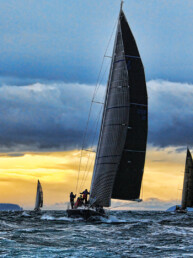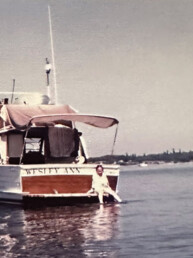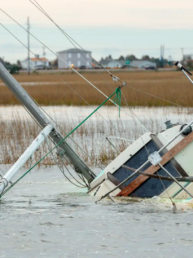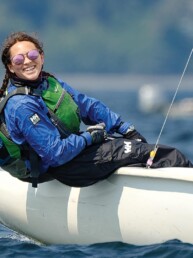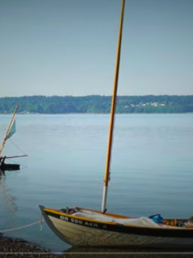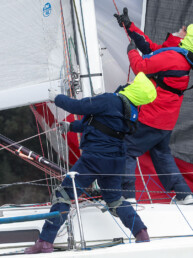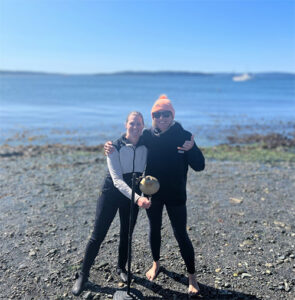
After writing about my solo Seventy48 adventure last year, I realized I was not alone. Any experience of this 70-mile human powered race from Tacoma to Port Townsend comes with the opportunity to tell the stories — and of particular interest to me are the stories of other women’s lives, adventures, tribulations, and victories. We all came to Tacoma on June 2, 2023 for different reasons, and our adventures would be very different. In sharing their who, what, why, when, and where, I hope readers find the resonance and inspiration in these passages that I do.
Although I almost dropped out at one point, I persevered and ended up doing my personal best, beating my old time by 2 hours and ringing the bell after 17 hours and 41 minutes. Prior to the race, I had excruciating lower back pain and was dealing with many worthy and distracting projects in other areas of life, so my winter had not been full of paddling and cross training. I had signed up for the Seventy48 at the 11th hour, and my back kept reminding me of the lack of training. The moment I considered pulling out, though, I thought of seeing my son at the finish line — that little man is my hero.
I am learning just how different every year of this race can be. I have heard many people say, “Wow, you all had such wonderful conditions!” but it felt like there was always one force against you, even with extensive voyage planning.
So, with my story giving a little context to who is sharing these perspectives from others, here are their stories…
Seychelle Webster
This was the first time in five years in the existence of this race that a female has placed first in the Standing Up category. Seychelle Webster, a world class athlete and new mother from Melbourne Beach, Florida, crossed the finish line in 15 hours and 28 minutes. Her win touched so many of us who, up until that point, had participated but hadn’t seen that kind of recognition and accomplishment. After crossing the finish line she took her baby to her breast and kept “giving.”
Seychelle grew up in Florida, and her introduction to SUP was a desire to do yoga on a paddleboard. She first stepped onto a race board several years later, and now enjoys the challenge and journey associated with endurance paddling. “It’s a competition you do mostly with yourself rather than against others. It’s not about the will to be the best. It’s about the will to be your best and to just keep going. It makes you feel so strong and powerful.”
For Seychelle, the toughest point in the race was when it got dark. She thought we were going to have current with us, but it had felt like it had been against us for the majority of the way. “What got me through were several things. I am a deep optimist and at that time it was so gorgeous out. The full moon and the city lights and the bioluminescence, and I had company. And even though it was a head wind, I reminded myself it was a rather light headwind and that things could be worse. So I kept pushing.”
Carol Shick
This was Carol Shick’s first Seventy48, though she’s had a long career in outrigger paddling — competing, coaching, and sitting on boards and perpetuating the sport regionally and nationally. She said this of her first Seventy48: “This race taught me a lot about the mental and emotional aspects of taking on such an adventure, but it applies to any challenge in life.” She went on, “My approach to training for Seventy48 taught me how insecure I was in my understanding of my abilities and capabilities. During the race, I gave myself permission to find joy in the process and the moment.”
The toughest point for Carol was leaving Kingston and heading to Point No Point. She felt she had too much weight in the boat, some joint pain, and was falling asleep! As she considered these challenges, she was not fraught with anxiety or insecurity, doubt, or harsh criticism of herself. It “just was” she recalls. While the goal was to finish the 70 miles, the goal wasn’t to do so at the cost of giving up my joy of being there. “The race was a healing journey for me.” Trust and self love got her through her self doubt, and her decision to stop racing was the perfect one for her at that time.
Lindsey Virdeh
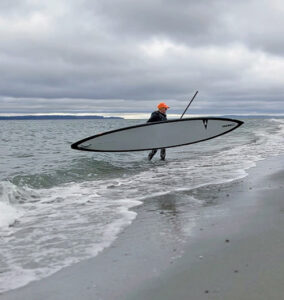
Lindsey Virdeh of Seattle returned this year after completing the race in 2022 on a SUP. She mentioned that after years of being in the mountains, she started looking for ways to get out on the water on her own and with her daughter. One day early in the pandemic a friend let her try his paddleboard, which sparked her interest. “In July 2020, my daughter and I were at the beach down by the Ballard Elks, and Liza Shehan and Jessi Wasson (Ballard Elks paddlers) pulled up with their big, shiny SIC RS boards; and I approached them, introduced myself, and started asking questions, and that was it.”
Lindsey paddles more for its personal benefit than to train. “I have ADHD, and I choose to be unmedicated, so getting out on the water for long periods of time allows me to focus on one thing. It gives my brain a rest from all the distractions at home. I get so much joy out of being on the water, and the feeling of using my body to its fullest extent lights me up to no end. I love experiencing my own strength.”
At Foulweather Bluff, Lindsey fell in. “I was wearing my merino wool base layers, and while they dried relatively quickly, I was still cold for about 2 hours after that. At that point in the race, I was dehydrated. I was going through losses of important friendships in my life so I was not thinking clearly. My head was not in the game this year.” She recalls how difficult it was paddling through the wind. “There was a huge surf break at Kala Point and we were paddling through that and against the wind, and it felt impossible. I tried to shove more bars in my mouth while paddling on my knees and making inches of progression. It was too much. I stopped at Fort Townsend Park, and called it.”
Shelby Mass
“Endurance paddling lights me up because it’s a chance to experience different environments and to challenge myself along the way… I am only content when I am facing a challenge, and there is so much that goes into a long paddle. I have learned much about the water and feel… a part of it every time I go out.” – Shelby Mass
Shelby Mass from Oak Harbor started paddling in Florida, where she was mostly doing it to “adventure around” different parts of the coast. The first time she saw someone training on a race board, she had to try it. “The more I am on the water, the more I want to explore and challenge myself,” she said.
Shelby is in her early 30s and works full-time, traveling extensively. About two months out from the race, she felt a huge disconnect between her mind and her body that she didn’t know how to fix. “At first, I was pretty frustrated with myself that my plan wasn’t working out and my solution was to let go of my original plan. It didn’t fit in with my reality.” Once she let go, she could appreciate the training she was able to find the time for, and still give herself the rest she needed with “a lot less guilt.”
Shelby also went in the water during Seventy48. Getting herself back on her board, recovering, and having to strategize how she was going to continue was probably the most “rewarding part of the event” for her. “The difficulty came later that night when my mental fatigue hit, but physically I was still facing challenging conditions. I focused on the little things around me, like the beautiful moon rise, and let myself appreciate how small my challenges really were. Ultimately, I knew I was going to make it. “Shelby did make it, coming in strong after 38 hours and 49 minutes.
Whether the thought of an adventure race makes you think “What’s the big deal?” or “I could never imagine…”, the truth is you never know what anyone’s path looks or feels like. Whatever race anyone ended up completing, it was theirs and theirs alone. There’s such inspiration in each story, and every single one of these women are my role models.
Erica Lichty is the founder of the SEASTR, a non-profit that promotes women who adventure in the Pacific Northwest. Check out: www.seastrpnw.com
Erica Lichty
Erica Lichty is the founder of the non-profit, SEASTR, which was founded to optimize the human/environment connection, using water to engage women in their own process of healing and evolution, making a difference for themselves, their families, and their communities.

